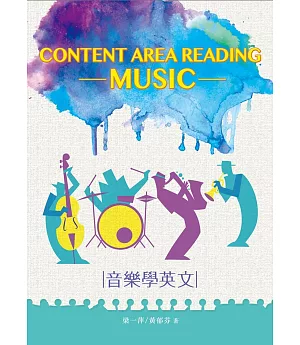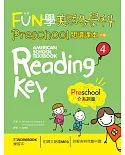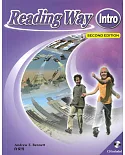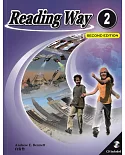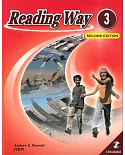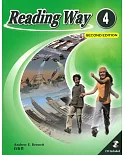爵士樂的發源地在哪裡?電子音樂的種類有哪些?百老匯的音樂劇從何而來?本書用12篇有趣又深入淺出的短文介紹西方音樂的輪廓,除了有豐富的音樂單字,每單元末還有習題幫助複習。是一本授課、自學兩相宜的英語教材,讓讀者輕鬆用音樂學英文。
ESP(English for Specific Purposes)為1990年代興起至今的英語教育觀念,強調英語學習內容應在各種專業領域下「言之有物」的實境文本,一般稱為專業英文。學習各種Content Area
Reading、跨學科英文等,能彌補以往英語教學脫離生活應用的缺點。書林旗下品牌簡單出版於2005年起曾出版「ESP知識英文」系列書籍,主題有美術、宗教、理財等等,廣受好評。
國立臺灣師範大學英語學系於2015年開始研發ESP教材,並獲教育部計畫支持,由英文系教授及專業教師共同編寫各種主題,並經過實際教學場景應用,涵蓋音樂、運動、時尚等多樣領域。本書針對台灣學生學英語的需求,編寫主題短文,並設計簡單練習、關鍵字彙註釋及參考中譯,能幫助學生快速吸收、輕鬆理解內容,盼能啟發讀者用英文探索知識,並從中獲得學習的樂趣。
本書特色
1、12篇附上中譯的短文,在閱讀過程中迅速習得如何用英語表達音樂知識。
2、單元末皆有習題測驗,協助檢視學習成效,並輕鬆背好單字。
3、內容包含音樂的歷史、文化以及應用層面,學英文之餘也能長知識。
作者介紹
作者簡介
梁一萍
美國麻薩諸塞大學美國研究博士,現為國立台灣師範大學英語系專任教授,編著有《鬼舞:美國原住民誌異小說》、《亞/美之間:亞美文學在臺灣》、《移動之民:海外華人研究的新視野》等書。
黃郁芬
德國海德堡大學英國文學與音樂學雙碩士,現為輔仁大學、國立台灣師範大學、台北商業大學英語系講師。她對音樂極有熱情,試著結合英語教學與音樂賞析,幫助同學用英文來享受音樂的美妙,學習西方音樂知識,並增進英文能力。
梁一萍
美國麻薩諸塞大學美國研究博士,現為國立台灣師範大學英語系專任教授,編著有《鬼舞:美國原住民誌異小說》、《亞/美之間:亞美文學在臺灣》、《移動之民:海外華人研究的新視野》等書。
黃郁芬
德國海德堡大學英國文學與音樂學雙碩士,現為輔仁大學、國立台灣師範大學、台北商業大學英語系講師。她對音樂極有熱情,試著結合英語教學與音樂賞析,幫助同學用英文來享受音樂的美妙,學習西方音樂知識,並增進英文能力。
目錄
01 –Introduction to Music 認識音樂 008
“What is Music?”
02 –Classical Music I古典音樂(一) 016
“Brief Introduction to Classical Music—Medieval and Renaissance”
03 –Classical Music II古典音樂(二) 022
“Brief Introduction to Classical Music— Baroque, Classical, and Romantic”
04 –The Effects of Music音樂帶來的影響 030
“Classical Music Affects in Seven Ways”
05 –Nursery Rhymes童謠 038
“The Shocking Origins of Nursery Rhymes”
06 –Folk Music民間音樂 048
“Understanding Folk Songs”
07 –Jazz Music爵士樂 054
“Jazz Through the Decades”
08 –Film Music電影配樂 064
“Functions of Music in Movies”
09 –Musicals音樂劇 072
“A Musical Timeline”
10 –Modern Music I: Technology and Music 078
現代音樂(一)──科技與音樂
“You’re Your Own Band!”
11 –Modern Music II: Electronic Music 084
現代音樂(二)──電子音樂
“EDM for Newbies”
12 –World Music世界音樂 092
“ World Music―Music Across the Globe”
Answer Keys 解答 098
“What is Music?”
02 –Classical Music I古典音樂(一) 016
“Brief Introduction to Classical Music—Medieval and Renaissance”
03 –Classical Music II古典音樂(二) 022
“Brief Introduction to Classical Music— Baroque, Classical, and Romantic”
04 –The Effects of Music音樂帶來的影響 030
“Classical Music Affects in Seven Ways”
05 –Nursery Rhymes童謠 038
“The Shocking Origins of Nursery Rhymes”
06 –Folk Music民間音樂 048
“Understanding Folk Songs”
07 –Jazz Music爵士樂 054
“Jazz Through the Decades”
08 –Film Music電影配樂 064
“Functions of Music in Movies”
09 –Musicals音樂劇 072
“A Musical Timeline”
10 –Modern Music I: Technology and Music 078
現代音樂(一)──科技與音樂
“You’re Your Own Band!”
11 –Modern Music II: Electronic Music 084
現代音樂(二)──電子音樂
“EDM for Newbies”
12 –World Music世界音樂 092
“ World Music―Music Across the Globe”
Answer Keys 解答 098
內容連載
01 Introduction to Music
What is Music?
Some people talk of farmers who play music to their animals, swearing that it increases milk production. Others cite recent studies showing that listening to fast music while driving can increase the chance of an accident. And then there are those who are adamant about the Mozart Effect, claiming that it boosts intelligence. While it’s true that some of these claims may indeed be overblown, it’s hard to disagree that music can have a powerful, almost hypnotic effect on our minds.
But what is music, and why are humans so absorbed by it? Every culture in our recorded history has had music in one form or another. It goes without saying that we’ll have music at all of our important cultural events, whether it’s a wedding or a wake. Composer Edgard Varese defined music as “organized sound,” but does that fully encompass what music is? Why is it that what sounds like music to some may sound like noise to others?
The technical meaning of music can be described in encyclopedias as an “art of combining sounds or sequences of notes, created by voices or various kinds of musical instruments, into rhythmic, melodious and harmonious patterns pleasing to the ear and satisfying to the thought and emotions.” But this definition lacks resonance with aficionados of some forms of music. It may be possible to understand music conceptually, rather than by definition. As a concept, we can say:
1 Music is generally understood as sounds organized with purpose, by humans or in human ways.
2 Music is a medium of communication, sharing many common points with spoken language.
What is Music?
Some people talk of farmers who play music to their animals, swearing that it increases milk production. Others cite recent studies showing that listening to fast music while driving can increase the chance of an accident. And then there are those who are adamant about the Mozart Effect, claiming that it boosts intelligence. While it’s true that some of these claims may indeed be overblown, it’s hard to disagree that music can have a powerful, almost hypnotic effect on our minds.
But what is music, and why are humans so absorbed by it? Every culture in our recorded history has had music in one form or another. It goes without saying that we’ll have music at all of our important cultural events, whether it’s a wedding or a wake. Composer Edgard Varese defined music as “organized sound,” but does that fully encompass what music is? Why is it that what sounds like music to some may sound like noise to others?
The technical meaning of music can be described in encyclopedias as an “art of combining sounds or sequences of notes, created by voices or various kinds of musical instruments, into rhythmic, melodious and harmonious patterns pleasing to the ear and satisfying to the thought and emotions.” But this definition lacks resonance with aficionados of some forms of music. It may be possible to understand music conceptually, rather than by definition. As a concept, we can say:
1 Music is generally understood as sounds organized with purpose, by humans or in human ways.
2 Music is a medium of communication, sharing many common points with spoken language.
網路書店
類別
折扣
價格
-
新書7折$175
-
新書79折$198
-
新書79折$198
-
新書79折$198
-
新書85折$213
-
新書88折$220
-
新書88折$220
-
新書9折$225

